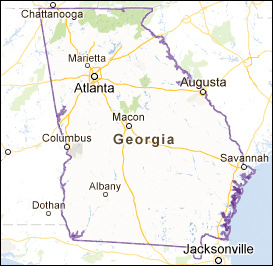
Donald Trump continues to defy American political logic as is evidenced in a new Atlanta Journal-Constitution primary poll. (Go to AJC story)
By Jim Ellis — Thursday, Aug. 31, 2023
President
Trump: Georgia Numbers Jump — Former President Donald Trump continues to defy American political logic as is evidenced in a new Atlanta Journal-Constitution primary poll of the Georgia Republican electorate.
Once again we see polling evidence of Trump gaining support after being indicted. This particular study first went into the field one day after the former president and his associates were officially accused of breaking Georgia election law.
The University of Georgia’s School of Public and International Affairs regularly conducts the research studies for the AJC. According to their just-released survey (Aug. 16-23; 807 likely and probable Republican primary voters; live interview), Trump captures 57 percent of the Republican primary respondents’ support.
Florida Gov. Ron DeSantis is a distant second at 15 percent and no other contender even reaches the five percent support threshold.
Since pollsters began testing the Georgia 2024 Republican presidential race, this current AJC poll reveals Trump’s strongest standing within the Peach State electorate. At the end of March, for example, WPA Intelligence detected a one-point DeSantis lead over Trump at 37-36 percent.
It is the crosstabs, however, that tell an even more interesting story. While Trump largely lost the 2020 presidential race because too many female suburban voters who supported him in 2016 turned toward Joe Biden four years later, this poll surprisingly projects his standing among female respondents who plan to vote in the Georgia Republican primary at 57.9 percent, an even stronger number than their male counterparts at 54.5 percent.
In fact, of the seven categories and 23 segments within the AJC respondent sample, Trump leads in all categories and fails to claim the top spot in just one segment. The seven categories are gender, race, age, education level, ideology, income, and partisan persuasion. The 23 segments are response cells within those categories.
A small number of Democrats (number undisclosed) responded that they intended to vote in the Republican presidential primary. Not surprisingly, this is the group in which Trump fails to lead.
Former UN Ambassador Nikki Haley is the favorite among the small number of Democrats who plan to cast their ballot in the GOP primary. In this category, Haley scores 26.1 percent support with New Jersey former Gov. Chris Christie posting 21.7 percent support. Conversely, Trump attracts only 4.3 percent among Democratic Republican primary voters.
He does rather surprisingly lead among those who identify as liberals at 30.0 percent and who say they will vote in the Republican primary. Trump holds a 12.5 point edge over Haley within this segment, and a 17.5 point advantage over Christie.
Trump’s strongest segment is found with those making between $25,000 – $49,999 annually. Here, the former president captures a whopping 76.0 percent support factor.
Though leading among the wealthiest in the sampling pool ($150,000+ annual income level), many of whom are Trump’s own peers, he records his weakest showing within a favorable cell. Within this group, the former president scores only a 30 percent support figure, though still better than any of his opponents.
The final question on the AJC poll relates to the indictment charges and just how seriously the respondents view the accusations. Here, again, we see the female respondent cell performing more in Trump’s favor than the men. A total of 46.5 percent of the female respondents believe the charges are very serious or somewhat serious. Among male respondents, that figure is a larger 52.3 percent.
Minorities break in the opposite manner, which is another surprise from this survey. Only 40 percent of minorities believe the charges are very or somewhat serious, while 48.5 percent believe they are not too serious, or not serious at all.
This poll confirms that Trump continues to enjoy strong support within the Republican primary base, which alone may be enough for him to win the presidential nomination. It is undeniably significant that these favorable partisan numbers are coming from Georgia, the state of his most recent indictment and the most important swing state overall in the general election.
Francis Suarez: Drops Presidential Bid — Miami Mayor Francis Suarez (R), who was unable to jump-start a long-shot presidential campaign, culminating with not qualifying for the first presidential debate, announced that he is officially ending his national bid. The move came with little in the way of surprise since, for the most part, he was not even registering in national polls.




